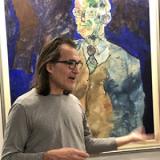Rachel Snider, Class of 2018

Major: Exercise and Movement Science (EXMS)
Minor: Nutrition and Food Science (NFS)
What are you working on now (e.g., grad school, a job, volunteering, passion projects)?
Since graduating I’ve been working in Dermatology, emergency medicine, and writing tutoring on the side. I’ll be applying to Physician Assistant programs this Spring.
What aspects of being a Writing Tutor have you brought forwards in your work today?
Working as a writing tutor taught me how to quickly form connections with strangers, understand their goal and point of view, and work together to clarify next steps and form a plan of action; all are skills that I use daily in healthcare! Being a writing tutor also allowed me to see the different ways in which people try to communicate a concept, and to determine which ways tend to be most effective. This gave me context for how my own writing may be interpreted by others, and how I might go about making it more clear for the reader. Additionally, being CRLA certified helped me during the interview process for my current writing tutoring position.
What was your favorite part about being a Writing Tutor?
I always felt a sense of satisfaction when a tutee was noticeably more happy and confident about their project after we had worked together.
Do you have any advice for current Writing Tutors (in general, or for life after college)?
Try things out and learn from experience! There’s something to be said for doing research and planning ahead, but nothing helps inform your opinion like getting your hands dirty.
Sam DuBrown, Class of 2011

Major: Business Administration
Minor: Chinese
What are you working on now (e.g., grad school, a job, volunteering, passion projects)?
I work as a Human Resources Business Partner at the Massachusetts Institute of Technology in Cambridge, MA. I had graduated with my Masters in Human Resource Management in May 2019 and now spend my time working and volunteering with local organizations.
What aspects of being a Writing Tutor have you brought forwards in your work today?
Writing email communications and meeting with people one-on-one are large components of my job today. The experience of being a writing tutor helped me hone my listening skills because so often the dilemma was listening to students, asking questions to help them figure out exactly what they wanted their writing to say. Being a writing tutor offered me many opportunities to network and build relationships, with students and with other writing tutors.
What was your favorite part about being a Writing Tutor?
I really enjoyed meeting students studying other disciplines and at different UVM colleges and reading their work - each and every one of us has such a unique voice. In my last year at UVM, I had the opportunity to work with students who were studying abroad from China through the U.S. Sino Pathways program and it was the most rewarding experience; I had weekly sessions with a few students and facilitated a weekly class with two other tutors and an ESL instructor called the Conversation Circle. My time as a writing tutor with the program led to my first job post-grad. The day after I graduated from UVM, I moved into one of the freshman dorms to spend the summer as a part-time writing tutor, so I am very grateful for my time with the UVM Writing Center!
Do you have any advice for current Writing Tutors (in general, or for life after college)?
Take something away from each interaction you have because you do learn from every student you meet with - and sometimes, it's an interaction you might not have had otherwise!
Max Bookman, Class of 2010

Major: Political Science
Minor: Spanish
What are you working on now (e.g., grad school, a job, volunteering, passion projects)? I am an attorney living and working in New York City. I specialize in New York alcoholic beverage law. My firm represents bars, restaurants, hotels, brewers, distillers and other businesses that produce or sell alcohol in New York.
What aspects of being a Writing Tutor have you brought forwards in your work today?
When I was at UVM, I became a founding member and co-Editor-in-Chief of The Water Tower. I thought that becoming a writing tutor would help me be a better editor. It certainly did. But I was surprised to find that being a writing tutor also made me a better writer. Over a decade later, the skills I learned as a writing tutor still enhance my own writing, as well as my editing of others' writing. Legal writing involves applying complex general rules to specific situations, and sometimes attorneys get bogged down in the details. Clients come to lawyers for advice, but are often confused by memos and emails from their lawyers written in legalese. Similarly, courts and regulatory agencies expect lawyers to make clear and effective written arguments, but those arguments are often rendered ineffective by overly complex writing. I regularly apply the strategies of writing to the end before editing, and WIRMI (What I Really Mean Is), to make sure my writing to clients is comprehensible for laypeople, and my writing to courts and regulatory agencies is crisp and focused. I also convey these skills to my teammates who I supervise at my law firm.
What was your favorite part about being a Writing Tutor?
I learned that I enjoy working one-on-one with people seeking advice. That experience, amongst others, was a building block in my decision to advise people for a living.
Do you have any advice for current Writing Tutors (in general, or for life after college)?
Effective writing is an important skill no matter where you end up in life. Whether you're writing a doctoral thesis, or just writing an email to your landlord demanding that she fix your broken toilet, being an effective writer will help you.
Keith Williams, Class of 2010

Majors: Anthropology and Classical Civilizations.
What are you working on now (e.g., grad school, a job, volunteering, passion projects)?
I am the program director of UVM’s Tutoring Center, part of the Center for Academic Success, where, in addition to some professional staff members, I help to supervise over 200 peer tutors. Outside of work, my 2 year old son, Levi, keeps me very busy.
What aspects of being a Writing Tutor have you brought forwards in your work today?
I carry with me many lessons and skills I first learned as a Writing Tutor: clear spoken and written communication, productive collaboration with others, and effective problem-solving. However, two of the biggest things that stick with me today are self-confidence and commitment to service. Through learning and hard work, I found myself capable of doing important things, but also of helping others. Working with and for community members is both important and personally fulfilling work, and working with students at the Writing Center really reinforced that for me.
What was your favorite part about being a Writing Tutor?
My favorite thing about being a Writing Tutor was getting to participate in ‘education’ without the formal enrollment as an Education major. Teaching and learning always interested me as a young person, and it was a tough decision to pursue other things. Getting to work at the Writing Center let me both pursue those other interests, but still cultivate skills and knowledge around teaching and learning. My experience as a Writing Tutor absolutely paved the way for my career over the next decade.
Do you have any advice for current Writing Tutors (in general, or for life after college)?
After you graduate, take the time to explore the world and yourself, and do it before you’re too settled. The experience one gains as a Writing Tutor can be an amazing springboard to teach English abroad or to do City Year or Teach for America. I encourage that all recent graduates consider living and working in a brand new place.
Steve Hausmann, Class of 2009

Majors: History and English
What are you working on now (e.g., grad school, a job, volunteering, passion projects)?
Assistant professor of history at the University of St. Thomas in Minnesota
What aspects of being a Writing Tutor have you brought forwards in your work today?
My time as a writing tutor was critical in teaching skills I use all the time in my job as a history professor. The work of history is often a written endeavor and my time as a writing tutor was critical in honing my own written communication skills. Additionally, my three years at the UVM Writing Center taught me how to teach writing and foster writing skills in others. I’m a firm believer in the philosophy of universal design and in the ability of everyone to communicate in writing using their own voice. I learned both of these concepts as a writing tutor and have integrated them into my own teaching.
What was your favorite part about being a Writing Tutor?
Learning under Sue Dinitz changed the way I think about writing and education more broadly. I also really enjoyed getting to know fellow UVM students and helping them succeed. Meeting Monica Picard, the woman who would be my partner of ten years and counting, was a nice surprise too!
Do you have any advice for current Writing Tutors (in general, or for life after college)?
Cherish the time you’re spending at the Writing Center! It might not feel like it now, but you’re changing not just the lives of those you work with, but your own as well. My years at the Writing Center were incredibly formative, and it’s only looking back on them from a decade’s remove that I really see that clearly.
Liz Fenton, Class of 2000

Majors: English and Women's Studies (The program is now Gender, Sexuality, and Women's Studies, but it was just Women's Studies in the 90s.)
What are you working on now (e.g., grad school, a job, volunteering, passion projects)?
I am an English professor now--and I teach at UVM. It is both strange and wonderful to work at the place where I was an undergraduate student. My area of expertise is early American literature, and my subfield is U.S. religions. I offer courses in early U.S. literature and literary theory, as well as in Book History. I recently have taken up letterpress and have a few small printing presses, which I also use in classes.
What aspects of being a Writing Tutor have you brought forwards in your work today?
When I was a tutor, I developed a love for working one-on-one with writers on all kinds of projects, and I think that's when I realized that I wanted to be a professor. I use many of the skills I learned as a tutor in my current work, but I probably draw the most heavily on that experience when I am working with individual students on writing projects. I still remember a lot of the techniques for working through challenges at different stages of the writing process, and I teach them to students whenever I can. When I'm in conferences with students, I often feel like I'm back in L/L (where the Writing Center used to be), just talking to a peer about an assignment or a draft. One of the most important lessons I learned when I was a tutor was that every writer can come up with a good idea and execute it in an interesting way. But sometimes another set of eyes on the page, or an extra pair of ears to listen to ideas can be really helpful. That's how I still think of myself when I'm working with a student on a paper--the idea is the student's, and the execution is up to them, but I can ask helpful questions and offer strategies to assist when things get sticky.
I also use techniques I learned working in the Writing Center when producing my own drafts. I still read everything I write out loud. I still break projects down into smaller parts. I still print out drafts and write marginal notes and edit topic sentences right on the page. For me, one of the best things about being a tutor is that it made me a better writer, and I still draw on what I learned in the Writing Center, because I want my writing always to be improving.
What was your favorite part about being a Writing Tutor?
I really enjoyed the community of writing tutors. I met some folks in the Writing Center who became my dear friends, and we had a lot of fun. And I benefited immensely from the support and friendship of the Center's then-Directors, Sue Dinitz and Jean Keidaisch. The Writing Center always felt like a second home to me.
Do you have any advice for current Writing Tutors (in general, or for life after college)?
I'm terrible at giving advice! But one thing I wish I'd known when I was a student and a writing tutor is that if you pursue things that interest you and leave yourself open to possibility, it's often the case that opportunities you never considered will emerge. When I was a student, I was always worried about making enough money to pay my bills and lining up the next secure thing and being responsible. And that was good--I'm not saying don't do those things--but I think I worried way too much, and that worry often made it hard for me to just enjoy what I was doing or take risks. In my professional life, I've learned that sometimes it's all right to just relax a little and see what happens. When I was working as a tutor--and this remains true, I've found, in my teaching--the best advice for a lot of writing projects was simply, "Try something different, and see if it works." It's good advice for writing, and sometimes it's good advice for living, too.
Maria Hummel, Class of 1994

Majors: ENVS and English
What are you working on now (e.g., grad school, a job, volunteering, passion projects)?
I am an assistant professor in creative writing at UVM.
What aspects of being a Writing Tutor have you brought forwards in your work today?
How to guide others in taking ownership of revising their work, how not to be directive but to solicit people to become editors themselves.
What was your favorite part about being a Writing Tutor?
Meeting other students on campus who cared about writing.
Do you have any advice for current Writing Tutors (in general, or for life after college)?
Don’t forget to keep reading! Read for edification or read for pleasure but keep books in your life. You won’t regret it.
Peter Stebbins, Class of 1988

Majors: English and French Literature
Minor: Art History (I think....or almost!)
What are you working on now (e.g., grad school, a job, volunteering, passion projects)?
I am a grantee of the Walbridge Trust, dedicated to the display of artwork by David Bethuel Jamieson (1963-1992) at 3229 Walbridge Place, NW in Washington, DC; and, I direct The Lily and Earle M. Pilgrim Art Foundation, promoting the visual art of the African diaspora, an appreciation of artists who lack public recognition, and public access to art through best practices in preservation and placement of culturally important objects.
What aspects of being a Writing Tutor have you brought forwards in your work today?
Working with peers
What was your favorite part about being a Writing Tutor?
Continuing, focused, one on one relationships about communicating ideas through writing
Do you have any advice for current Writing Tutors (in general, or for life after college)?
We are part of an interconnected web of all things. Peer tutoring may seem like a way to help tutees one on one--and it certainly is--but it's equally helpful to tutors, and to that interconnected web, and to its evolution. With each individual session, in perhaps just the tiniest ways, as a whole we move forward toward clarity through close one-on-one reading, speaking, and writing. Language shapes our world.